- Home
- Lorenzo Carcaterra
Chasers Page 7
Chasers Read online
Page 7
Viktor Robinov chose his daughter, Natalie, to lead the Russians in their quest to conquer and rule the criminal world. She had trained by his side since her youngest years, and had been educated in both the best schools mob money can afford and the day-to-day lessons of running a vast and expanding criminal enterprise. She was fluent in four languages and had martial-arts and weapons expertise, as well as a business degree from Oxford. She was tall, angular, and beautiful, and she understood that in her work such beauty could be as vicious a weapon as a loaded gun or a jagged knife. Viktor was sixty-seven and succumbing to lung cancer when he last spoke to his daughter, anointing her the most powerful member of the Russian underworld.
“You’re ready now,” he said to her, his once full-bodied voice reduced to a mere rasp. “It is my time to die and your time to rule.”
“I don’t want to be without you, Papa,” Natalie said, not allowing herself the luxury of tears. She knew how little her father approved of any sign of weakness.
“And you won’t ever be,” Viktor said, reaching for her hand. “As I ruled with you by my side, so, too, shall you rule with me by yours. I will never leave you. My presence will be felt in every action, every decision, in your every thought. Know this, my sweet girl, and never forget it.”
“I won’t,” Natalie said with a slow shake of her head. “I swear it to you.”
“You will be tested, very early on,” Viktor said to her. “Not everyone is pleased that my only child, and a woman at that, has been chosen to run the operation. They will look to kill, rid you from the scene before you even have a chance to enjoy a taste of the vast power you will have at your disposal.”
“Who do you think it will be?” Natalie asked.
“The who, in this case, doesn’t matter,” Viktor said, his eyes the color of a wolf’s winter coat. “They are all thinking you are too weak, ill suited to command them. So you must act within the first hours of taking the reins, even before my body is buried. Send a signal to all that you are even more vicious than the Red Wolf they so feared. It is the only way you can assume control and keep it. You must do it fast, make sure it’s bloody, and, most of all, make sure it’s visible for all to know and see.”
“How many?” she asked.
“As many as it takes to get the message delivered,” Viktor said. “No soldiers, only those with high ranks and powerful posts. Include in this initial group the one who is your most trusted adviser and who all suspect has your heart.”
Natalie stiffened a bit, just enough for Viktor to notice. “Do you suspect it as well?” she asked. “That Vlad has my heart?”
“I have learned never to suspect,” Viktor said. “Only to believe. And, yes, I believe your heart belongs to that young gangster.”
“And yet you would have me kill a man you believe I’m in love with,” she said. “A man I may wish to wed and have by my side.”
“You can never love, Natalie,” Viktor said, wiping at his mouth with a cloth napkin. “In your position you can only taste love, be near it perhaps, embrace it on occasion, but never give yourself to it. Love is as big an enemy to you as trust. They can only bring you to ruin. You must never surrender to either one.”
“But you have loved me,” Natalie said. “And, before me, you loved Mama. Or am I wrong?”
“You speak the truth, I loved you both,” Viktor said, his words hard and as cold as the Russian air. “But even with that I made sure to have ears to your words and eyes to your movements. And, despite such caution, I was caught off guard by your mother’s betrayal, so much so that initially I doubted the evidence I knew to be valid. I questioned the truth that stood before me.”
Natalie leaned in closer to her father. “What are you telling me?” she asked.
“That if you are indeed to follow in my footsteps you must be prepared to have an even harder heart than I could ever have,” Viktor said. “Anyone can order a kill or do it himself, be it the death of a stranger, an enemy, or a friend. But not anyone can put to death a person to whom he has professed an unending love, someone with whom he has exposed his true self. Someone for whom he would risk all that he has worked to gain.”
“It was you that had Mama murdered?” Natalie said, barely able to get the words past her lips.
“Even worse than that, my Natalie,” Viktor said, taking in a series of deep and painful breaths. “Your mother met her death by my own hands. It was done in this very room and on this very bed. And I shed not one tear. Not back then and not now, even with my own death so close at hand.”
“Why are you telling me all this?” she asked, glancing for a brief moment at a framed photo of her mother on a night table, dressed in a black dress, a white string of pearls hanging loose around her neck. “And why now?”
“So that you are fully aware of the type of man I had to be in order to retain my position of power,” Viktor said. “And the kind of woman you need to be in order to maintain yours. And now is not just the only time I have left to alert you to this painful fact but the best time as well.”
“I don’t understand you, Papa,” Natalie said. “What are you trying to do to me?”
“My lesson is a simple one, my little Natalie,” Viktor said, gripping both her hands in his, thick purple veins coursing up his arms. “I need to know before I breathe my last that I have prepared you to run this organization in the manner required. I need to see the proof that I have indeed chosen the right person to succeed me.”
“And how am I to prove it?” Natalie said, wondering now if her father was merely lost inside the fuzzy haze of the various drugs his doctors were giving him to help him cope with the pain.
“End my life,” he said, his voice at full strength for this brief moment. “Do not allow your mother’s killer to breathe for one more pain-free second. Make me pay for what I did to her and for what I took from you.”
“Isn’t living with it pain enough for you?” Natalie asked.
“If you do indeed believe that, then my choice is already doomed,” Viktor said. “There is no pain in taking a life, only relief that you were the one spared. No matter whose life it was that was brought to an end.”
Natalie stared at her father and gazed into the harshness of his eyes. She leaned down and kissed him gently on both cheeks. She then reached across the bed, grabbed a pillow, and held it above her father’s face. She watched as he smiled up at her and gave her a silent nod. She eased the pillow down on his face and held it there, holding it tighter and with strength the moment she felt her father jostle and squirm. She kept it there until the life was drained from the wilted body of the most feared man in the Russian underworld.
“Your father never made mention of having a kid,” Boomer said to Natalie. “Then again, our meetings were never weighed much on the social end.”
“You knew my father?” Natalie asked, not bothering to hide her surprise.
“We butted heads once or twice,” Boomer said. “Other times, when it served both our interests, we buttered each other’s bread. He was a tough bastard, but old school all the way. He knew the rules and, while he may have bent them here and there, he usually stayed within the foul lines.”
“And you’re wondering if the same is true of me as well?” Natalie said.
“Only when it comes to a restaurant takeout,” Boomer said. “I want to make sure I aim my guns at the right targets.”
“You lost someone in that shooting,” Natalie said, both hands gripped around the now empty coffee container.
“My niece,” Boomer said, his eyes suddenly sliding from hers.
“I’m sorry for that,” she said, drawing in on Boomer’s sense of loss and despair. “But none of my guns were involved. It’s your choice whether you believe that or not.”
Boomer stared at Natalie, looking into a pair of eyes the color of night, and nodded, surprised at the warmth she conveyed. “Viktor never lied to me,” he said. “I’m going to take the points and spread that trait to his daughter.”
> “Do you need anything else from me?” she asked, her unlined face shimmering under the lights of the bridge.
“If I do, I’ll reach out,” Boomer said.
“And if you do I’m sure we’ll meet in a spot equally as romantic,” she said, gazing out at the river water lapping against a shoreline littered with old tires, blocks of cement, and rusty old train rails.
“I’ll make a point of it,” Boomer said.
Natalie turned back to him and smiled.
“I was sorry to hear about your father,” he said. “I lost my dad when I was young, too. It’s not something you shake off easy, doesn’t matter what end of the fence you play on.”
Natalie stayed silent, caught slightly off guard by Boomer’s words, watching as he turned and disappeared into the darkness and the low-hanging mist of the muddy path.
12
Andy Victorino ran a rubber-gloved hand slowly across the dead man’s bare chest, his long fingers resting on the two large bullet wounds just below the breastbone. They were in a dark tunnel, the rumblings of cars and trucks racing across the Cross Island Expressway sending loose dust particles and paint chips to the damp ground around them. The body belonged to a middle-aged white male with a swollen stomach and a Klondike Bill black beard. He was in full rigor, and his low liver temperature meant that he had been dead a full day shy of a week. Rats had feasted on the body, gnawing gaping holes in the areas around his neck and thighs. He was naked except for one soiled brown construction boot, minus laces and leather lip. “Has the look of another pump-and-dump,” a voice to Victorino’s left said. “It’s that time of year. This and half a dozen or so floaters are what come in like clockwork every spring. Sure as bees work flower beds.”
“Maybe,” Victorino said. “I’ll know more once I break down the crime scene, or what’s left of it, and then have him autopsied downtown.”
“You’re not going to find yourself much in either place, you ask me my thoughts on the matter,” the voice said, stepping closer to Victorino, the soles of his shoes leaving thick marks on the dark soot piled up next to the right side of the dead man’s head. “Both the scene and the vic have been stepped on like they were a fuckin’ dance floor.”
“You’ve been working homicide, what is it now, six, seven years?” Victorino asked, still not looking up at the man hovering over his crime scene. “And you still know as much now as you did six months in. It’s what’s not here means more to the solve than what you can see. You’re a good cop, Bennett, solid. But what keeps you from the next level is you always come in looking for the easy, and there’s never anything easy about death.”
“All right, Quincy,” Detective Sam Bennett said, calling Victorino by the nickname the department had pinned on him within weeks of his joining the Crime Scene Unit, Forensic Division. “Educate me. What am I not looking for that for sure you can plainly see?”
“The ones who killed him weren’t the ones who stripped him down and took away all his biologicals,” Victorino said, his words calm, measured, and confident. “That was done later—a day, maybe two on the outside, after the murder. The killers left him clean, didn’t take anything that belonged to him. Other than his life.”
“How do you know that?” Bennett asked, the sarcasm replaced now by a raised police antenna.
“First, the vic took two close-contact hits—first bullet stopped his heart, second was pumped in just to make sure there wouldn’t be a curtain call,” Victorino said, standing now, hands folded across his thin chest, eyes still on the dead man. “The doer was a pro, knew why he was sent here and wasted little time in getting it done. He came in clean and calm, pocketed the shell casings. Even if we had the gun in hand, the prints would lead us nowhere but some upstate cemetery.”
“How does all of that take you to where the shooter leaves here without doing a Salvation Army on the clothes?” Bennett asked.
“Logic, for one,” Victorino said with a slight shrug. “I mean, give it a second of thought and then tell me why a pro, paid in cash left in a safe-deposit box in a city that’s not this one, would strip a guy he just killed down to next to nothing. There’s no link between the two—none that we’ll ever find, at any rate. Two, you’re telling me he walks away from a murder site with his arms filled with a dead man’s clothes or, even worse, lugging a large black Hefty bag? Just so some pain-in-the-ass innocent bystander out taking his dog for a quick piss could spot him doing so? Never happens.”
“That’s your gut talking to you,” Bennett said, his gray jacket and crisp white shirt tight against the expanse of a set of broad gym-worked shoulders. “And, while all of what you say may be on the mark, you can’t really prove it; you can only argue in favor of it. You still don’t know with one-hundred-percent certainty that the shooter didn’t also lift the clothes.”
“Riddle me this then, Bennett,” Victorino said, leaning across the much taller detective and pointing toward the dead man’s feet. “Why would he go to all the hassle of a clothes raid and then leave behind one lonely little construction boot? And, before you answer, toss this little factoid into your head. The boot in question doesn’t belong to the vic.”
“To who, then?”
“If I had the answer to that, I would know who it was that took the clothes,” Victorino said. “And then you and me would maybe both be one step closer to tagging the hitter.”
“So who is it I’m supposed to go hunt down, exactly?” Bennett asked. “Other than maybe a construction worker minus a boot.”
“Soon as I get an ID on the departed I can maybe start to give you an idea,” Victorino said, turning to look down the length of the dark passageway. “Meantime, while I finish up here would you do me a solid?”
“If it’s doable,” Bennett said.
“Ask the lab boys to bag that large dead rat up against the wall behind us,” Victorino said. “And have them do a perimeter search around his body—five feet on either side ought to do the trick. They can bring everything they find to me down at the lab.”
“And what the fuck would I ask them to do all that for?” Bennett asked, disgust mixed with displeasure.
“The rat’s got a bullet in him,” Victorino said. “Could be just a strange coincidence—that happens every day, as you are well aware. Or it could be our shooter didn’t leave with all his shell casings. Either way, it’s worth us taking a look.”
“You are indeed one odd duck, Quincy,” Bennett said, walking away, careful not to step with too heavy a foot on the dirt patches in his path as he made his way toward the dead rat and the two technicians in blue windbreakers.
Victorino watched him leave, one gloved hand resting on the dead man’s chest, and nodded. “You have no idea,” he whispered.
Andy Victorino was raised among the dead.
His father, Francesco, arrived in New York City from his birthplace of Naples, Italy, fresh off a four-year sentence as an Italian POW in a camp run by a force of British and Australian troops. He was one of 272 prisoners, all of whom were treated as nothing more than mild annoyances who needed to be tolerated and, on rare occasions, admonished. Francesco moved into a back one-bedroom in a cold-water walk-up near the Manhattan West Side piers and, in less than a week’s time, found work at a local funeral parlor. There, working under the steady gaze of Gerald Miller, a thirty-year veteran of the death business, Francesco loaded and unloaded coffins into the back of idling hearses; picked up bodies from cramped apartments, stifling workplaces, and overrun hospital wards. He found comfort in the silent and difficult work, and solace in bringing a final peace to the suffering bodies he saw on a daily basis. He had grown accustomed to the face of death after the onslaught of a major world war in his native land had stripped him of his only home and the few relatives he had left. In his spare time, he mastered a new language by reading the daily tabloids tossed aside by the other workers at the funeral parlor, always with an English dictionary close at hand. And through those early months of hard work and peace, Frances
co began to set his sights on two major goals, both key ingredients in any immigrant’s dream: he wanted to open his own business and start a family.
He met his future wife, Lucia Selvaggi, at a funeral Mass for a middle-aged butcher who suffered a fatal heart attack as he sliced his way through a thick double-cut rib eye. She was twenty-five and had been married to a handsome young man who lost his life in a gambling dispute in a Tenth Avenue bar. The few friends Francesco had made during his short time in the States all advised him to wait and perhaps find a more suitable bride, one who wasn’t “tainted” by the widow’s stain. But living through the end trails of a war had drummed into Francesco the simple but uncomfortable fact that death reaches a hand to touch everyone, some sooner than others, and leaves in its silent wake a vast ocean filled with altered lives. He felt safe in Lucia’s presence, finding a comfort zone he had never known before, and allowed her entry into the gates that he kept locked and lowered to ward off any intrusion. There existed a mutual understanding between the two, shared sentiments that life was indeed a fragile gift—one that could be quick to evaporate. So he ignored the dire warnings pressed on him by concerned friends and settled down with the only woman he would ever profess to love, and they began their life together.

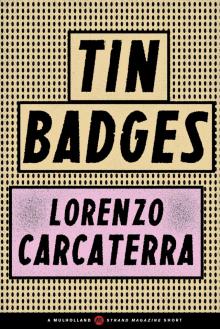 Tin Badges
Tin Badges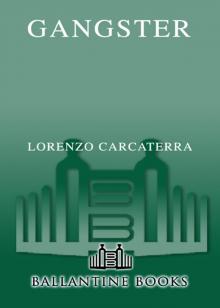 Gangster
Gangster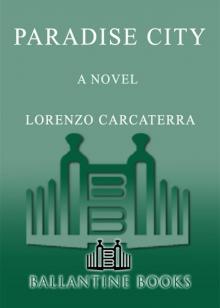 Paradise City
Paradise City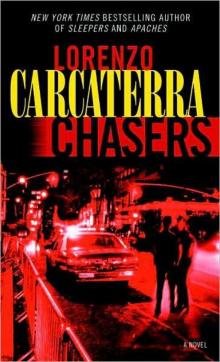 Chasers
Chasers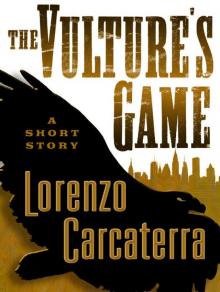 The Vulture's Game
The Vulture's Game Payback
Payback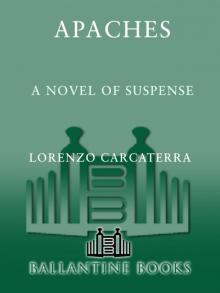 Apaches
Apaches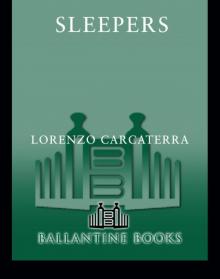 Sleepers
Sleepers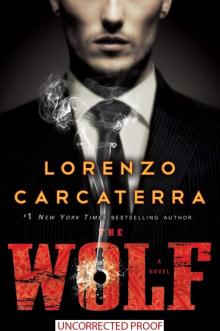 The Wolf
The Wolf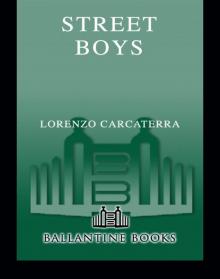 Street Boys
Street Boys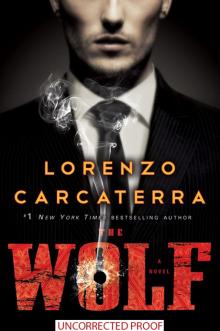 The Wolf: A Novel
The Wolf: A Novel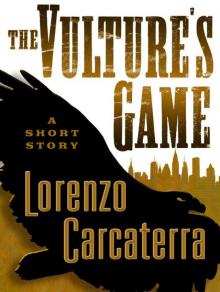 The Vulture's Game (Short Story)
The Vulture's Game (Short Story)